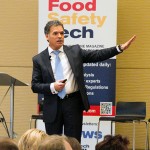Continuing on our journey to bring you the successes, best practices, challenges and accomplishments from the very best in this industry, this month I had the pleasure of interviewing Frank Yiannas, vice president of food safety at Walmart. In his role, Frank oversees all food safety, as well as other public health functions, for the world’s largest food retailer, serving more than 200 million customers around the world on a weekly basis.
Frank is a past president of the International Association for Food Protection (IAFP) and a past vice-chair of GFSI. He is also an adjunct professor in the Food Safety Program at Michigan State University, and in 2017 was awarded the MSU Outstanding Faculty Award. He’s also the author of two books, Food Safety Culture, Creating a Behavior-based Food Safety Management System, and Food Safety = Behavior, 30 Proven Techniques to Enhance Employee Compliance.
Mahni Ghorashi: What are you most excited about in our industry? What’s changing in a good way in the food safety sector?

Frank Yiannas: While there is no doubt that there are numerous new and emerging challenges in food safety, the many advancements being made should give us hope that we can create a safer, more efficient, and sustainable food system.
There is progress being made on many fronts: Whole genome sequencing is becoming more accessible; new tools are being developed for fraud detection; and FSMA is introducing stringent public-health surveillance measures that have dramatic implications for U.S. retailers and suppliers and our import partners.
Most importantly, consumers are now overwhelmingly interested in transparency. People today are further removed from how food is grown, produced and transported than at any other time in human history. Plus, they increasingly mistrust food and food companies due to the food outbreaks and scares we have faced in recent years.
Over the near-term, as we get better at detecting foodborne outbreaks, consumer mistrust will likely intensify; however, it’s clear to me that heightened consumer interest is hugely positive because it adds weight to our industry’s call for more accurate food labeling, more wholesome ingredients and enhanced food traceability. Ultimately, these are the kinds of measures that will improve the food system and enhance consumer trust.
Ghorashi: As you know, food shopping is moving online. It’s happening across the world, and at breakneck speed. What are retailers like Walmart doing to keep up?
Yiannas: That’s a great question. Walmart and other retailers are now developing new packaging materials and temperature control approaches, as well as new ordering methods, high-tech stocking systems and delivery modes.
Food shopping is moving online so quickly that regulatory requirements have not been able to keep up. That means it’s up to us, the retailers and food companies, to work with regulators to create and promote the necessary industry standards, best practices and logistical solutions.
I firmly believe that it is our responsibility as food retailers to advocate for consumers and strive to create a safer and more affordable and sustainable food system. With many more players across the global food chain now shouldering this duty of care, I am very optimistic that our industry is truly improving the lives of people around the world.
Ghorashi: What role is blockchain technology playing in food safety? What are the prospects for the future?
Yiannas: The emergence of blockchain technology and the successful completion of several pilots using it to enhance food traceability has resulted in a larger conversation about the importance of creating a more transparent digital food system.
It has also enabled food system stakeholders to imagine being able to have full end-to-end traceability at the speed of thought. The ongoing U.S.-wide romaine lettuce E.coli outbreak showed us, once again, that our traditional paper-based food tracking system is no longer adequate for the 21st century. An ability to deliver accurate, real-time information about food, how it’s produced, and how it flows from farm to table is a game-changer for food safety.
Blockchain has the potential to shine a light on all actors in the food system. This enhanced transparency will result in greater accountability, and greater accountability will cause the food system to self-regulate and comply with the safe and sustainable practices that we all desire.







